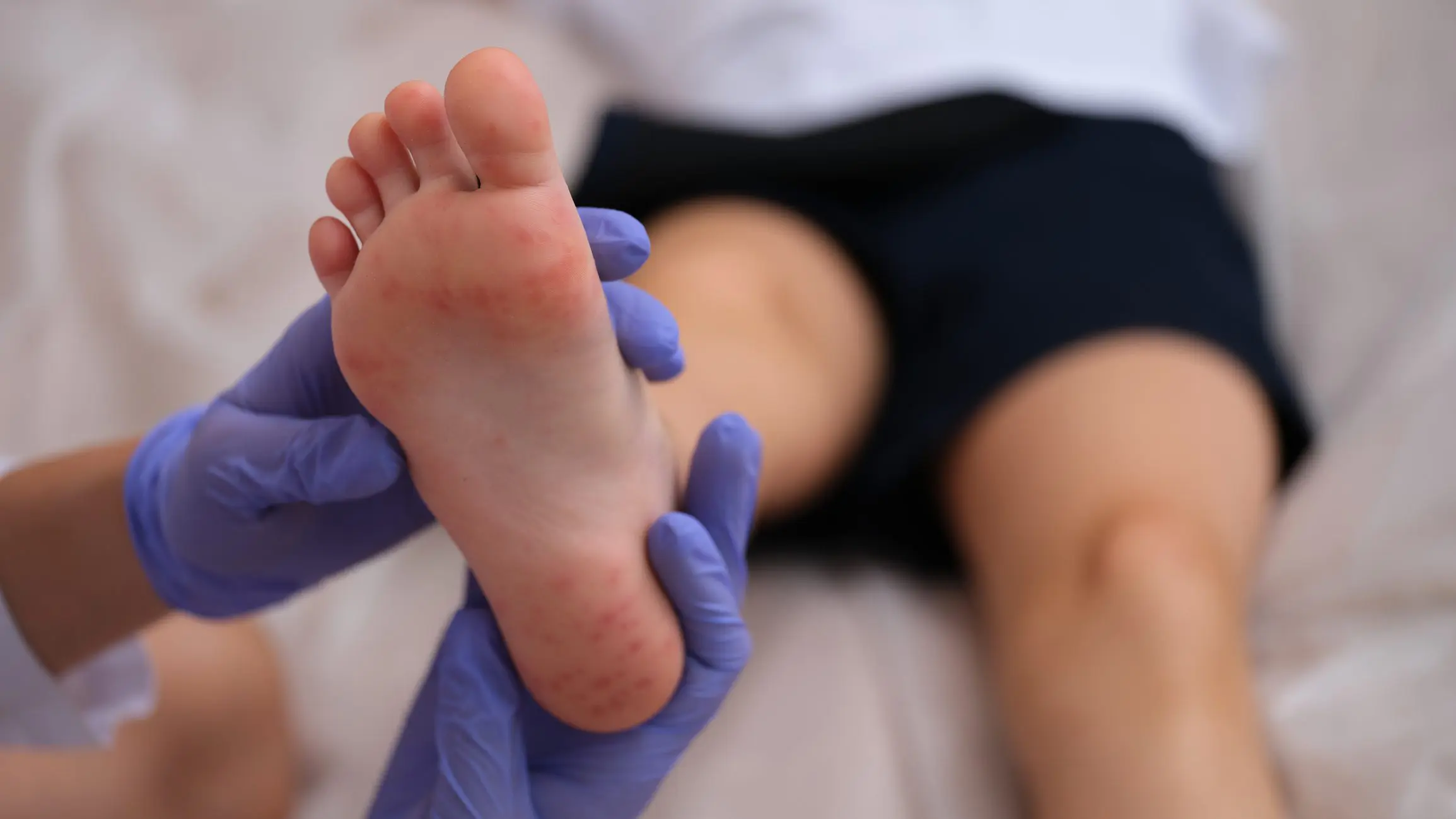Hand, Foot, Mouth
Hand, Foot, & Mouth Disease (HFMD) is a common viral illness, primarily affecting children under 5 years old. It leads to sores and rashes on the hands, feet, mouth, and even buttocks.
This article provides essential information about HFMD, including symptoms, causes, prevention, and diagnosis.
Who is Affected by HFMD?
Hand, Foot, & Mouth Disease predominantly impacts children under the age of 5. While it can occur at any time, it’s more prevalent during the summer and fall. The virus spreads easily through coughing, sneezing, and contact with infected stool.
Understanding the warning signs is crucial, especially for parents, as early treatment is vital.
Symptoms of HFMD
- Fever: HFMD can cause a fever that can reach up to 103 degrees Fahrenheit.
- Sore Throat: A sore throat is a common symptom of HFMD.
- Sores/Blisters: Painful sores or blisters can appear on the hands, feet, mouth, and buttocks.
- Rash: HFMD often results in rashes on the hands, feet, and mouth.
- Loss of Appetite: Children with HFMD may experience a loss of appetite.
Causes of HFMD
Hand, Foot, & Mouth Disease is caused by enteroviruses, including polioviruses, coxsackieviruses, echoviruses, and enteroviruses. The virus spreads through:
- Respiratory Transmission: Breathing in air contaminated by sneezing, coughing, or talking.
- Contact with Infected Stool: Direct contact with infected stool can transmit the virus.
- Fluid Contact: Coming in contact with fluids from blisters or sores.
Unfortunately, there is currently no vaccine available to prevent HFMD. However, there are effective preventive measures:
Preventing HFMD
- Hand Hygiene: Regularly wash hands with soap and warm water. Encourage children to do the same, especially after using the bathroom or changing diapers.
- Surface Disinfection: Clean and disinfect frequently touched surfaces, such as handles, toys, and countertops.
- Avoid Close Contact: Steer clear of close contact with individuals diagnosed with HFMD. Avoid hugging or sharing utensils and cups with infected individuals.
If a child becomes infected and attends daycare, it’s crucial for them to stay home to prevent the spread of the disease.
Diagnosing HFMD
If you or your child experiences a sore throat, body rash, and sores, visit one of our Midwest Express Clinic locations. Diagnosis of HFMD is typically based on an examination of the sores and rash. In more severe cases, a throat or stool sample may be collected and sent to a testing laboratory for confirmation. Early diagnosis and treatment can lead to a smoother recovery.

Frequently Asked Questions (FAQs)
What is Hand, Foot, & Mouth Disease (HFMD)?
HFMD is a common viral illness primarily affecting children under 5 years old. It leads to sores and rashes on the hands, feet, mouth, and even buttocks.
Who is most susceptible to HFMD?
Children under 5 years of age are most commonly affected by HFMD. However, anyone can contract the disease.
What are the typical symptoms of HFMD?
Symptoms of HFMD include:
- Fever: HFMD can cause a fever that may reach up to 103 degrees Fahrenheit.
- Sore Throat: A sore throat is a common symptom.
- Sores/Blisters: Painful sores or blisters may appear on the hands, feet, mouth, and buttocks.
- Rash: HFMD often results in rashes on the hands, feet, and mouth.
- Loss of Appetite: Children with HFMD may experience a loss of appetite.
What causes HFMD?
HFMD is caused by enteroviruses, including polioviruses, coxsackieviruses, echoviruses, and enteroviruses. It spreads through respiratory transmission, contact with infected stool, and fluid contact.
Is there a vaccine to prevent HFMD?
Unfortunately, there is currently no vaccine available to prevent HFMD.
How can HFMD be prevented?
To reduce the risk of HFMD:
- Practice good hand hygiene: Regularly wash hands with soap and warm water, especially after using the bathroom or changing diapers.
- Disinfect frequently touched surfaces: Clean and disinfect items like handles, toys, and countertops.
- Avoid close contact: Steer clear of individuals diagnosed with HFMD, and avoid sharing utensils or cups with infected individuals.
What should I do if my child has HFMD?
If your child exhibits symptoms of HFMD, it’s advisable to seek medical attention at one of our Midwest Express Clinic locations for an examination and diagnosis.
How is HFMD diagnosed?
Diagnosis of HFMD is typically based on an examination of the sores and rash. In more severe cases, a throat or stool sample may be collected and sent to a testing laboratory for confirmation.
Is there any specific treatment for HFMD?
Currently, there is no specific antiviral treatment for HFMD. However, medical providers may recommend treatments to alleviate symptoms, promote comfort, and prevent complications. It’s important to get plenty of rest, maintain good nutrition, and stay hydrated.
What should I do if my child attends daycare and has HFMD?
If your child is diagnosed with HFMD and attends daycare, it’s vital for them to stay home until they are no longer contagious to prevent the spread of the disease. Check with the daycare facility for their specific guidelines on returning to daycare.
Hand, foot, and mouth treatment is available at these locations:
Illinois
Aurora
Blue Island
Bolingbrook
Bourbonnais
Burbank
Calumet Park
Carol Stream
Chicago Ridge
Cicero
Elmhurst on Butterfield
Elmhurst on York Street
Evergreen Park
Lombard
Matteson
Melrose Park
Norridge
Northbrook
Richton Park
River Forest
Skokie
Tinley Park on Harlem
Tinley Park on LaGrange
Westmont
Wheaton
Willowbrook

